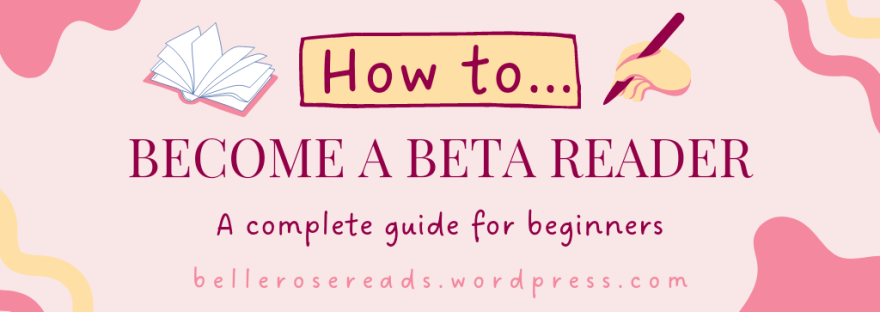Hello everyone!
I’m so excited to be bringing you this new post, which is very special to me as being a beta reader has become an important part of my life for the past year and a half. For months I’ve wanted to talk about this topic on the blog, however I was waiting to feel like I had enough experience to give you information that could help you and perhaps motivate you to become a beta reader if that’s what you’d like to do!
I made my best effort to cover all the information I think one needs to know before starting as a beta reader, however if after reading the post you have any doubts, you can comment below and I’ll answer them. I’ll be talking about what a beta reader is, what they should and shouldn’t do, how to connect with authors to work with, and much more. I want to clarify that nothing I’ll say here is a rule of thumb, I’ll be speaking entirely from my experience and personal opinion.
Okay, first of all and in case someone doesn’t know…
What is a beta reader?
“A beta reader is usually a test reader of an unreleased work of literature or other writing, who gives feedback from the point of view of an average reader to the author. A beta reader is not a professional and can therefore provide advice and comments in the opinions of an average reader. This feedback is used by the writer to fix remaining issues with plot, pacing, and consistency. The beta reader also serves as a sounding board to see if the book has had the intended emotional impact.”
-Karen Hellekson, Kristina Busse (2006). Fan Fiction and Fan Communities in the Age of the Internet: New Essays
My own experience
Since I’ve never talked about my personal experience as a beta reader here, I will start this post by talking about it so you can know more about what I’ve done as a beta reader so far.
I became a beta reader in November 2020, being an avid reader (and aspiring writer) for around 7 years before that. I didn’t have any kind of experience and reached out to fellow beta readers Fanna from Fanna for Books, and Bianca from Your Words My Ink to give me some advice on how to begin. Now I can say that their advice was greatly helpful, so I want to thank them for taking the time to clear up my doubts and help me start in this beautiful world. Since then, I’ve worked for over 75 authors, I’ve beta read short stories, novellas, novelettes, novels and even complete duologies. I think that my clients’ words can say more about my work than I can, so here is my page where you can check their testimonials.
What should a beta reader do and don’t do?
I believe that there are some lines you shouldn’t cross as a beta reader, and some basic things that the author will expect of you at most times, so I’ll list them below.
The DO’s:
- Share your opinion in a clear and respectful way: When writing a beta reader report, try to put your thoughts in order and express them in a clear and organized way, as that will make it easier for authors to understand your experience reading the book. Sometimes, you may find behaviors, dialogues or situations that won’t be pleasant in the manuscripts -if there’s something in the story that you dislike, communicate that in a respectful way.
- If you liked (or disliked) something, explain why: This is one of the most important things when being a beta reader. Comments like “I loved that scene” or “I think I don’t like this character” aren’t helpful for the authors and won’t help them see what they’re doing right or wrong. So think for a minute -why did you like that character? Was it because of their vibrant personality, their good sense of humor, how caring they are? Did you dislike this character for something they did or said? Always try to give a good explanation.
- Respect the author’s creative process and don’t try to change it: This is a delicate subject and perhaps one of the most important things to have in mind as a beta reader, especially if you will make suggestions on possible changes to make on the manuscript. You can suggest changing certain things, but never digress too much from the author’s vision. Try to always make suggestions that won’t sacrifice the essence of the story, as that’s one of the most important things to keep. Remember that you’re not the author, you won’t rewrite the story or make it an entirely different thing, your aim should be targeting the weak points and highlighting the strengths, as that’s what usually will be most helpful for the author.
- Ask questions, be in contact with the author throughout the reading process if needed: I don’t usually do this because most times, I don’t have any questions that need to be immediately answered so I can keep beta reading, but it has happened in the past. Something I asked the authors mid-beta reading process was the characters’ ages if they’re not explicitly stated in the story, mostly to have a solid opinion on whether they’re acting according to their age.
- Tell the authors what they’ll be receiving from you before starting the beta reading process -and deliver just that: Be clear and transparent on what you’ll deliver, whether it’s a detailed report, a questionnaire, if you’ll make small typo corrections… make sure the author knows that they’ll get from you and meet the expectations you created when advertising your service.
THE DON’TS:
- Share their work: You should never, ever, ever share their manuscripts with anyone else. This is their property, not yours, and you could even get (rightfully) sued for sharing without permission. That said, the best thing to do is to keep the file in a safe place (your personal device) and delete them once the work is done.
- Perform changes in the story: This might be rather obvious, but beta readers write their reports in separate Word or Google docs to send it to the author and let them decide what suggestions to implement. You should never perform any changes in the story, not even if there are typos or grammar mistakes. If that’s the case, point them out in an inline comment (if you’ve offered to do this) so they can be aware.
- Disclose what you’ve discussed with the author: You should never talk about the author’s work with anyone else but the author. As I’ve stated in the points above, it’s important to respect the author’s privacy in every step of the way. Similarly, author’s should also never blame you or use you as a reason as to why they perform certain changes in the story –you’re only there to give suggestions and your insight, and it’s up to them and their sole responsibility to implement them or not.
- Stay out of touch or ghost them: It is very irresponsible to agree to beta read a story and disappear. I know life happens, and it’s possible that certain circumstances might make it impossible for you to not deliver feedback on the agreed time (or at all), but it’s important to always let the author know it. Reach out and explain while you will be taking longer to deliver feedback, or why you won’t be able to read (or finish reading) the book. In the latter case, if it’s a paid service, you should offer a refund as you’ve been unable to deliver the service they paid you for. Believe me; you’ll give a better impression by communicating why you were unable to do something than by disappearing and not saying anything at all.
- Set unrealistic expectations: You have to be transparent about what you can offer the author. If you don’t see yourself writing a 15-page report, don’t offer one. If you don’t see yourself delivering feedback within 24 hours, don’t offer to deliver feedback within that time frame. Don’t offer anything you know you won’t be able to deliver, and as I said above, let authors know just what they’ll be receiving from you.

BETA READING AS A PAID SERVICE
Should beta readers charge for their service?
This is a very delicate subject to some. I’ve seen some discussions on Twitter about it and opinions are mixed. As I said when I began writing this post, everything that’s said here is from my opinion, experience and perspective. If you ask me, the only answer to that question is: if the beta reader wants to. It isn’t wrong to beta read for free, and it isn’t wrong to beta read for a fee. Beta readers don’t force anyone to pay them, they put their services out there and it’s up to the author to take on the offer or not. Beta reading a book takes time and effort, not just to read but to provide feedback, which can sometimes be several pages long. It is totally up to the beta if they want to exchange their time and effort for free or for a fee, as it’s also totally up to the author if they want to take on the beta’s offer or not.
How do I begin?
Now, if you’ve decided you want to offer your beta reading services in exchange for a fee, you need to understand that in order to get experience, figure out what you can and can’t offer, get testimonials and so on, the best way to go is to offer to beta read for free first. That way, after you’ve done some free beta reads, you will know what the process is like, how long it takes you to deliver feedback depending on the length, genre, etc., how to structure your reports and have a clear idea of what you can offer to potential clients, and for they to have some testimonials to look at before deciding to hire you or not.
How do I find clients?
Disclaimer: Though the title above says “clients”, most of these methods also work to find people that are seeking free beta readers, so feel free to check them out if you’re a beginner or if you’re just looking to beta read for free.
You’re probably thinking: okay, I will begin as a free beta to gain experience and gather some testimonials –but where do I find people that need betas to read their books? I’ll explain below. Regardless of the method, it is important to always be polite.
- Twitter: In Twitter there are lots of people seeking beta readers. You can find them through the #betareader hashtag mostly. You can also put yourself out there and tweet about being open to beta read, and if you add the correct hashtags (#betareader #writingcommunity #amwriting #amreading might be some good ones) chances are someone will reach out.
- Facebook Groups: There are Facebook groups in which people seek beta reading service. Just look at “Beta Readers” or “Beta reading” on Facebook’s search bar and you’ll find several groups. Always make sure to read and follow the guidelines of these groups when joining them.
- Goodreads: There are also several groups on Goodreads to connect authors and beta readers, whether paid or free. Two of the most popular ones are called “Beta Reader Group” and “Beta / Proof Readers”. Always make sure to read and follow the guidelines of these groups when joining them.
- Fiverr: This website is only for paid services (not just for beta reading, but for several other services). I haven’t used it so I can comment on how good it is, but you have to know that the website takes a percentage from the money you make while selling your services through it.
- Reddit: This is also a website I haven’t used and I think mostly free betas can benefit from it, but there’s a community dedicated to beta readers in it.
How to build a good beta reader service page?
One important thing to do when offering a beta reading service is to have a page in which you’ll gather all the information potential clients need to know about you and your service. Its content is more often than not what will make them hire you in the first place, so you need to make sure you have a good beta reading service page.
- Be transparent on what you will (and will not offer): I’ve said this several times already but transparency is key to prevent any misunderstandings. Things like time-frame, the average length of your reports, whether you’ll include inline comments or not, what you usually address in your reports, are some things I’d suggest including.
- Be concise and communicate all the information in a way that’s easy to understand and access: Make sure to structure the page with the necessary titles and subtitles, and preferably stick to brief but concise paragraphs, it’s important for the potential client to easily find the information they’re looking for, and a big paragraph with all the information in it, disorganized and rambly, will give them a negative impression and perhaps make them unable to understand exactly what you’ll be offering, leaving them with more doubts than answers.
- Have a Q&A section: This is something I haven’t done yet but I will soon. It is good to take note of those questions you constantly get from authors and put them all in a section on your page so they can easily access the information. It would save lots of time for them and you also, as they won’t have to contact you to ask the question themselves. For example: what is your usual turnaround time? How much do you charge for stories under 5K words?
- Contact info: This is rather obvious but is important to make your contact information (whether it’s an email or a Google Form, your Twitter handle, or anything else) visible so the potential clients can know where to contact you.
- Be clear on what you would read and what you would not: Every reader is different, and it’s good to include on your page things like what genres you read and you don’t, and whether there are some triggering topics you don’t read about. There are also tropes readers don’t like (for example, second chance trope, or friends-to-lovers) so if you don’t like or prefer not to read anything in particular, it’s good to add this information on your page. Similarly, you can add your preferred genres and tropes.
- Testimonials: Like I’ve said at some point in this point, it is important to gather testimonials so potential future clients can see what past clients have to say about your service. If you can add the genre and age group of the books you’ve read, that would be great. (Example: Jane Doe [the author], YA Contemporary Novel [Age group, genre, and length of the story, respectively])
- Straight-forward, concise page title: I don’t know much about SEO, but it’s a fact that a concise title would position your page on the search engines much better than a long, complicated title will. Simple titles like “Beta reading services” or “Beta reader for hire” are short, concise and just enough for potential clients to know who you are and what you’re offering.
That is all for today’s post! You have no idea of how happy I am to finally be able to bring it to you, and I really hope that it’s helpful for you to begin in this amazing world.
If you liked it and found it helpful, please like the post and comment your thoughts below. As I said at the beginning of the post I’m open to answering any questions you may have!
Until the next time!









This is so informative! I’ve been wondering how to become one. Thank you so much for making this post 😀
LikeLiked by 1 person
I’m glad it was helpful! Thank you so much for reading it🤍
LikeLike
Wonderful post, Cielo! I love how you broke everything down and provided your experiences in a clear way. I’ve considered trying to offer beta reading services but I worry it will “ruin” my love of reading, even though I am an excellent editor & proofreader, so I’ve steered clear. I’m sure this will help so many people!
LikeLiked by 1 person
Thank you Kat! I tried my best to give an explanation that I hope will help people who want to get started as beta readers. I totally understand your fear, and I think the solution would be choosing the books you feel intrigued by and those you’d read by yourself and not just for work -that will make the experience to be better and it’ll feel a bit more like reading just for pleasure 🙂
LikeLiked by 1 person